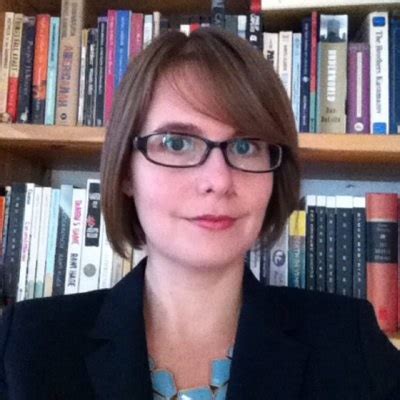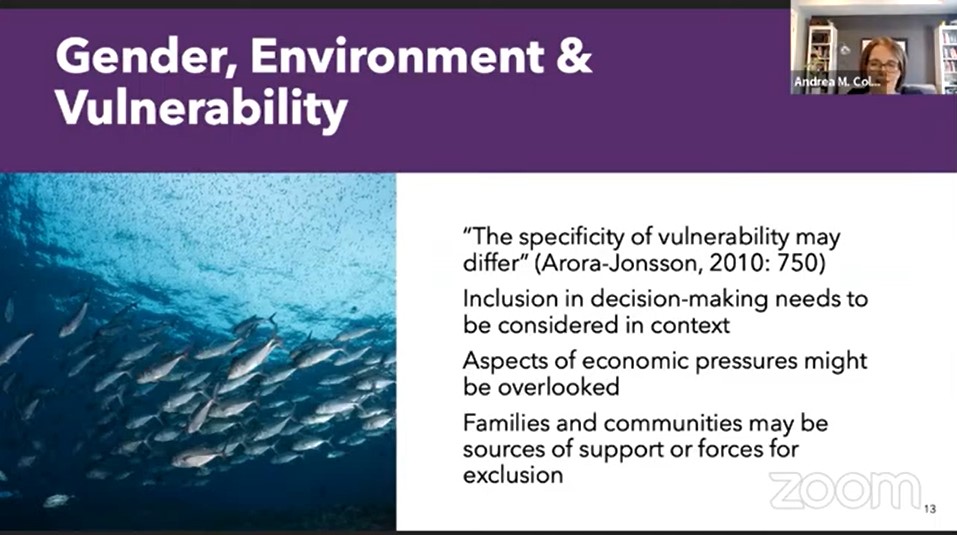This talk by Andrea M. Collins of the University of Waterloo in Canada provided a high-level overview of the various tools and perspectives for undertaking gender-focused analysis in resource sectors such as small-scale fisheries. Drawing from gender studies, feminist political ecology, feminist political economy, and political science, this talk dispelled the idea that gender analysis means only focusing on women. It showed how understanding the many dimensions of gender roles and relations can improve the analysis of resource management and economic activity, expand our understanding of vulnerability and empowerment, and advance policy-relevant outcomes.

Andrea was careful to make it clear to the audience that gender is best understood as a relationship of a person to one or more others. Gender should be understood as a social structure that shapes for example economic spaces and activity, political spaces and activity and familial and community spaces and the relations between people in these spaces. In other words, gender represents a person’s identity, but it also refers to the social role of a person and goes beyond sex.
Other conditions that affect what behaviour or roles people are expected to play in their society may be marked by religion, caste, refugee status, wealth or other dimensions. In other words, context matters a lot as to how gender molds a person’s vulnerability or power.
The gender role of women does not automatically mean that they are always vulnerable and weak. Rather, asking questions beyond the widespread stereotypes will help getting a more realistic impression and understanding of gender relations in family, community and wider society: who has access to economic and other resources and can, for example, effectively take part in social, economic and legal decision making. Such improved understanding has great potential in better decision making and more adequate policies to frame conditions within which people operate.
Click here for the full webinar presentation and Q&A session.

Académie de la pêche artisanale
- SSF and Environmentalists rethink fisheries together
- Rendre la pêche équitable
- La surpêche étrangère alimente la crise migratoire meurtrière du Sénégal vers l’Europe
- Mundus maris at MARE 2025
- Small-scale fishers at the center of ocean governance and food security
- Rendre la pêche équitable dans l’UE : 25 mars 2025
- Relations entre l’Homme et la biodiversité au travers de différentes échelles
- Célébration de la Journée mondiale de la pêche au Nigeria, 21 novembre 2024
- Mundus maris a participé à la Journée mondiale de la pêche 2024 organisée par la Canoe and Fishing Gear Association of Ghana (CaFGOAG).
- Contribution de Mundus maris à la consultation publique de l’UNOC3
- Sommet sur la pêche artisanale à Rome, 5-7 juillet 2024
- Symposium régional sur la pêche artisanale européenne, Larnaca, Chypre, 1-3 juillet 2024
- Réunion d’urgence sur la pêche dans la Baltique, Bruxelles, 26 juin 2024
- Ambivalent role of Market and Technology in the Transitions from Vulnerability to Viability: Nexus in Senegal SSF
- Shell fisheries as stewardship for mangroves
- Edition Africaine du 4ème Congrès Mondial de la Pêche Artisanale (4WSFC) à Cape Town, du 21 au 23 novembre 2022
- Journée mondiale de la pêche, 21 novembre 2023
- Séminaire en ligne : Défis et opportunités de la pêche au Nigeria
- Présentation de l’application FishBase au Symposium de Tervuren
- Conférence MARE sur la Peur bleue – Mundus maris réfléchit
- The Transition From Vulnerability to Viability Through Illuminating Hidden Harvests, 26 May 2023
- Les sessions de l’EGU se concentrent sur la géoéthique et l’apprentissage collaboratif
- Solidarité avec les artisans pêcheurs du Sénégal et de la Mauritanie
- The legal instruments for the development of sustainable small-scale fisheries governance in Nigeria, 31 March 2023
- Tools for Gender Analysis: Understanding Vulnerability and Empowerment, 17 February 2023
- Community resilience: A framework for non-traditional field research, 27 January 2023
- Sustainability at scale – V2V November webinar
- 4WSFC Europe à Malte, 12-14 septembre 2022
- Mundus maris prend part au Sommet de Rome consacré à la pêche artisanale
- Women fish traders in Yoff and Hann, Senegal, victims or shapers of their destiny?
- L’Académie continue son travail à Yoff
- Illuminating the Hidden Harvest – a snapshot
- Virtual launch event FAO: International Year of Artisanal Fisheries and Aquaculture
- The Small-Scale Fisheries Academy as a source of operational support to PA Guidelines
- World Fisheries Congress, Adelaide, 20-24 September
- Mundus maris supports the fight of Paolo, the fisher, in Tuscany, Italy
- Rattrapage – Academy PAD à Yoff, 27 févr. 2021
- Renforcement des capacités des acteurs de la pêche artisanale
- Essai des méthodes de formation lors de la phase pilote de l’Académie PAD au Sénégal
- Une première – Inauguration d’une Académie de la pêche artisanale au Sénégal
